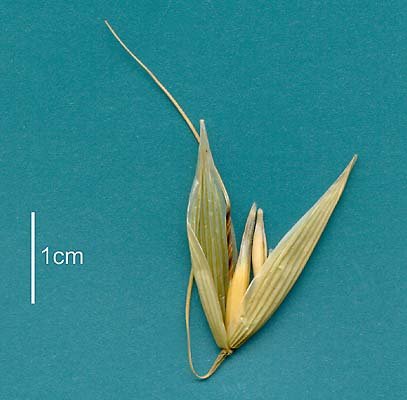Avena byzantina* K.Koch. Linnaea 21: 392 (1848).
Classification.
(GPWG 2001) : Subfamily Pooideae. Tribe Poeae.
Type of Basionym or
Protologue Information: T: (B).
Key references
(books and floras): [2002] D.Sharp & B.K.Simon, AusGrass, Grasses of
Australia, [2008] S.W.L.Jacobs, R.D.B.Walley & D.J.B.Wheeler, Grasses
of New South Wales (162).
Illustrations:
[2008] S.W.L.Jacobs, R.D.B.Whalley & D.J.B.Wheeler, Grasses of New South
Wales, 4th edn (162).
Habit. Annual.
Culms erect or geniculately ascending, 50–150 cm tall. Mid-culm nodes glabrous.
Lateral branches simple. Leaves mostly basal. Ligule an eciliate membrane, 3–7
mm long, abaxially hairy. Leaf-blades 15–30 cm long, 2–9(–15) mm wide.
Leaf-blade surface glabrous.
Inflorescence.
Inflorescence compound, a panicle. Panicle elliptic, 10.5–25 cm long.
Spikelets.
Spikelets pedicelled. Fertile spikelets 1 or more flowered, with 1 fertile
floret (2–4), comprising 2–4 fertile floret(s), with a barren rachilla
extension, lanceolate, laterally compressed, 25–30(–35) mm long.
Glumes. Glumes
similar, thinner than fertile lemma. Lower glume lanceolate, membranous,
without keels, (7–)9 -nerved. Upper glume elliptic, 25–33 mm long, membranous,
without keels, (7–)9–11 -nerved.
Florets.
Fertile lemma 15–20 mm long, without keel, 7 -nerved. Lemma apex entire or
dentate, awned, 1 -awned. Median (principal) awn dorsal, 25–35 mm long overall,
without a column. Palea apex lobed. Anthers 3.
Continental
Distribution: Europe, Africa, Temperate Asia, Australasia, Tropical Asia,
and South America.
Australian
Distribution: Western Australia, Lord Howe.
Western Australia:
Roe.




Notes.
Introduced. Flowers Oct.-Nov. Fruits Oct.-Nov.
